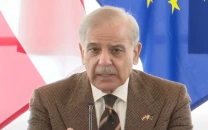UN rights chief criticises 26th Amend
"Constitutional reforms must be in line with international human rights law," statement says

United Nations Human Rights chief Volker Turk has expressed concern that the recently passed 26th Constitutional Amendment would "seriously undermine" judicial independence.
The Amendment has introduced several changes related to the judiciary, including the removal of the Supreme Court's suo motu powers and granting parliamentarians the authority to nominate the next chief justice of Pakistan from among the three most senior judges of the Supreme Court.
Turk was concerned that the "latest constitutional amendments - adopted hastily, without broad consultation and debate - will seriously undermine independence of the judiciary", the UN Human Rights office said on X (formerly Twitter) on Tuesday.
"Constitutional reforms must be in line with international human rights law," the statement added.
A day earlier, the Human Rights Commission of Pakistan (HRCP) voiced strong reservations about the 26th Constitutional Amendment, expressing concerns that key aspects of the law could undermine judicial independence.
The amendment was passed into law on October 21, and while the final version of the law appears less extreme than earlier drafts, HRCP remains concerned, a statement from HRCP Chairman Ahsan Iqbal Butt said.
The HRCP feared that the amendments could allow for excessive political control over the judiciary, threatening its independence.
A particular point of contention for HRCP was the composition of the Special Parliamentary Committee, which had been tasked with nominating the chief justice of Pakistan.
On Monday, the International Commission of Jurists (ICJ) strongly criticised the passage of the 26th Constitutional Amendment, labelling it a "blow to judicial independence."
The Commission stated that the amendment represented "a blow to judicial independence, the rule of law, and human rights protection".
In a statement, Santiago Canton, the ICJ secretary general, warned that the reforms bring an "extraordinary level of political influence over the process of judicial appointments and the judiciary's own administration".
Canton added that the changes "erode the judiciary's capacity to independently and effectively function as a check against excesses by other branches of the State and protect human rights".
The ICJ further criticised the rapidity with which the amendment became law, pointing out that the draft changes were kept secret, with no public consultations held before they were introduced and passed by parliament.
"It is alarming that a Constitutional Amendment of such significance and public interest was passed in such a secretive manner and in less than 24 hours," Canton said.




















COMMENTS (2)
Comments are moderated and generally will be posted if they are on-topic and not abusive.
For more information, please see our Comments FAQ